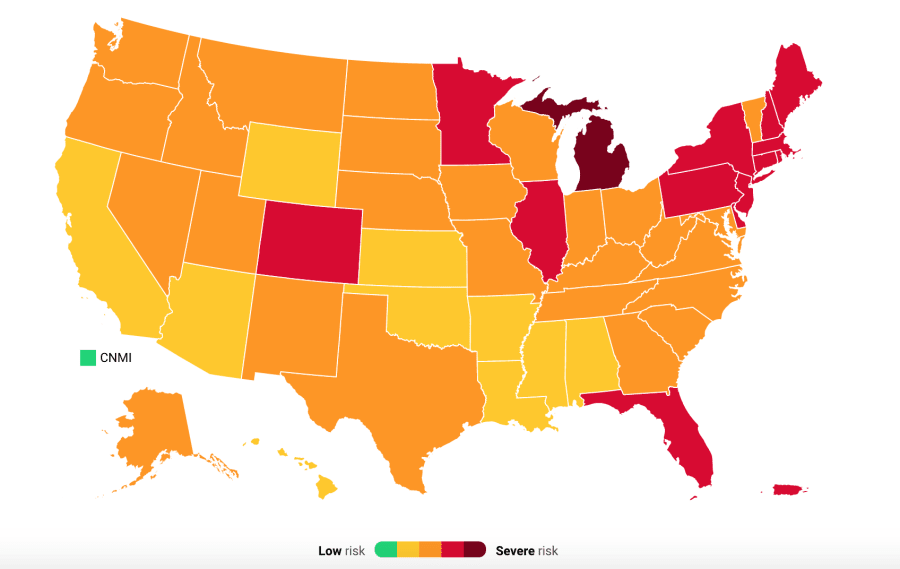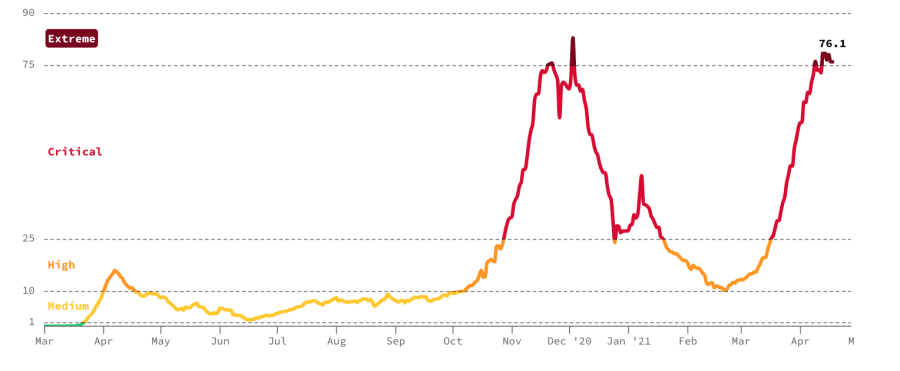Michigan continues its battle with COVID-19 spread, now categorized as at a “severe” risk level for a virus outbreak as the state leads the nation in new virus cases.
Since mid-February this year, coronavirus spread in Michigan has rapidly increased, causing COVID cases and hospitalizations to surge once again. Earlier this month, the state was leading the entire U.S. with its number of daily new virus cases, as well as virus infection and positive test rates. As of April 20, Michigan’s position unfortunately has not shifted much: The state is now categorized by Covid Act Now as being at a severe risk for a COVID-19 outbreak -- the only state currently categorized at such a high level.
Recommended Videos
UPDATE: The state’s risk level was lowered to “very high” by Covid Act Now on April 21. However, Michigan continues to lead the nation in daily new virus cases and positive COVID test rates.
On April 15, Covid Act Now increased Michigan’s risk level from “very high” to severe as virus spread compounded. Since last year, the research group -- comprised of technologists, epidemiologists, health experts and public policy leaders -- has been monitoring and identifying each state’s risk level for a COVID outbreak in real time.
Several other states are struggling with rising coronavirus infections as well, with 13 states labeled at a very high risk level by the group. The remaining states are labeled at “high” and “medium” risk levels, with no states currently considered “low” risk.

Let’s dive into the specific Michigan data.
Michigan’s daily new COVID cases
Since our last report on April 2, the number of new COVID cases being reported in Michigan each day has risen significantly.
According to Covid Act Now, over the last week, Michigan is reporting an average of 76.1 new COVID-19 cases each day per every 100,000 residents -- or 7,601 new cases on average each day -- as of Tuesday. That number has decreased slightly over the last few days, after peaking at 78.7 on April 13, the data shows.
Earlier this month, the state was reporting an average of 56.7 daily new virus cases per every 100,000 residents. In early March, the state had reached a low daily case rate following the surge in virus spread in November and December of last year.

Covid Act Now’s data largely aligns with the data reported by the state of Michigan: According to data received by the state, Michigan has reported an average of 6,598 new COVID-19 cases each day over the last week (as of April 19) -- one of the highest averages seen in the state since December. On April 13, the state reported its highest 7-day moving average for daily cases this year: 7,014.
That average has been steadily increasing since reaching a low point in mid-February, and has been decreasing slowly since the April 13 peak.
Michigan’s daily new COVID case rate is the highest in the U.S., with Rhode Island, New Jersey and Pennsylvania behind it, each reporting an average of 41.2, 40.8 and 38.1 daily new cases per every 100,00 residents, respectively.
Michigan’s coronavirus infection rate
One metric that has seen some improvement in recent weeks is Michigan’s COVID-19 infection rate.
As of Tuesday, the data shows that Michigan’s virus infection rate is about 1.03 -- meaning that every individual who contracts COVID-19 is infecting, on average, 1.03 other people.
“Because this number is around 1.0, it means that COVID continues to spread, but in a slow and controlled fashion,” the report reads Tuesday.
Earlier this month, Covid Act Now reported that Michigan’s virus infection rate was 1.29 -- the highest in the nation at that time. As of April 20, the state now ranks 22nd in the nation in terms of COVID infection rates.
According to the research group, a state’s infection rate is indicative of the direction that the state’s virus cases may be heading.
“Infection rate represents how fast COVID is spreading in a given area right now by estimating the number of people that a newly infected person goes on to eventually infect,” the report reads. “Daily new cases may be low, but if the infection rate is high, then we know that daily new cases will be high in the near future.”
Earlier this month, the state struggled with a high daily virus case rate and high infection rate. Now, the state’s case rate is much higher, but the infection rate is much lower. In line with the statement above, it seems possible that the state’s lower infection rate might indicate that the daily new cases will be lower in the near future.
Related: Michigan governor says COVID-19 infections could be dropping
States with the highest infection rates as of April 20 include Maine, Oregon and Nevada, who each have rates of 1.19, 1.17 and 1.17, respectively.
Michigan’s positive virus test rate
Michigan’s positive COVID test rate has increased over the last several weeks and is currently higher than any other state, the data shows.
According to Covid Act Now, as of April 20, Michigan’s positive test rate has reached 14.2 percent, which reportedly indicates that “testing in Michigan is limited and that most cases may go undetected.” Data received by the state shows a similar number for Michigan: Over the last week, the state’s positive test rate has averaged about 13.81 percent, the data shows.
Earlier this month, the research group reported Michigan’s positive test rate at 11.9 percent.
State health officials have previously pushed for a positive test rate of 3 percent or less, and Covid Act Now concurs, labeling test rates below 3 percent as “low.”
As of Tuesday, Michigan’s positive test rate is considered “high” and is the highest in the nation. A positive test rate above 20 percent is considered “critical,” and the state hasn’t seen those numbers since the onset of the pandemic one year ago.
Other states with the highest positive COVID test rates are: Nevada with 9.7 percent, Pennsylvania with 9.1 percent and Florida with 8.9 percent.
Virus hospitalizations in Michigan
Coronavirus-related hospitalizations have been rapidly rising in Michigan as virus spread surges throughout the state, and have now reached an all-time high.
According to data from the state, more than 4,300 Michiganders are currently hospitalized with COVID-19 as of April 19. Covid Act Now says that about 84 percent of the state’s ICU beds are currently occupied, suggesting that “hospitals may not be well positioned to absorb a wave of new COVID infections without substantial surge capacity,” the report reads. “Caution is warranted.”
On Monday, Michigan’s chief medical executive Dr. Joneigh Khaldun said that the state’s case numbers may be shifting in the right direction, but that several metrics -- including the state’s hospitalization numbers -- are concerning.
“I will say I’m still concerned about the current test positivity rate, the current numbers of people who are in the hospital for COVID-19. But, what we are seeing now over the past several days, the trend indicated we might be starting to see a slowing in the rate of the rise of our cases compared to a month ago,” Khaldun said.
“There is no question our hospitals are still seeing a lot of patients, treating a lot of patients with COVID-19 and other medical conditions,” she continued.
More: As COVID numbers show slight improvement hospitals still need help, Michigan’s top doctor says
Over the last few weeks, health systems in Michigan have reported concerns about reaching critical capacity levels due to an influx of COVID patients amid the virus surge. Last week, Beaumont Health announced that its Metro Detroit hospitals had, in fact, already reached a critical capacity level and urged residents to take precautions to help slow virus spread in the region.
Related: University of Michigan: Latest COVID surge ‘hammers ER workers’
No new restrictions to combat virus surge
Despite the state’s surge in virus spread that has left hospitals overwhelmed, Michigan officials have maintained that no new virus restrictions will be issued. Instead, officials hope to combat increased virus spread by ramping up COVID vaccinations in the state.
Though a significant number of vaccines have been administered in Michigan so far, national health experts disagree with Gov. Gretchen Whitmer’s plan, arguing that vaccinations will not immediately help slow rampant virus spread and will take weeks to benefit the state’s metrics. The director of the U.S. Centers for Disease Control and Prevention (CDC) said last week that the answer to Michigan’s alarming rise in COVID cases isn’t to “vaccinate our way out” of it, but to “shut things down” like the state did last spring and summer.
During a news briefing last week, Gov. Whitmer instead pushed coronavirus therapies in an effort to help residents infected with COVID-19 and keep them from becoming hospitalized.
Whitmer says that the state has smart policies in place, such as the mask mandate, but COVID fatigue is a serious issue among residents. Last Friday, Whitmer blamed noncompliance for the resurgence in virus spread.
When asked if she has the political ability to take more aggressive action to address the state’s surge, Whitmer said that state officials “do retain some powers,” but that they remain “incredibly divided after the politics of this difficult moment.”
Also on Friday, the state extended the COVID-19 order that establishes restrictions on gatherings, restaurants, entertainment venues and more through May 24.
“Michigan continues to implement smart health policies and mitigation measures to fight the spread of COVID-19,” said Elizabeth Hertel, director of the Michigan Department of Health and Human Services. “This includes the requirement to wear a mask while in public and at gatherings, limits on indoor residential social gatherings larger than 15 people with no more than three households, and expanded testing requirements for youth sports.”
Learn more: Michigan extends COVID rules for gatherings, masks, restaurants, entertainment venues
Prior to the extension, state officials urged residents to continue taking precautions in their personal lives to reduce virus spread, and to avoid dining indoors at restaurants and bars as infections soared.
You can see Covid Act Now’s data for each state by clicking here.
Looking for COVID-19 vaccines in Metro Detroit: Track openings, clinics, appointments

